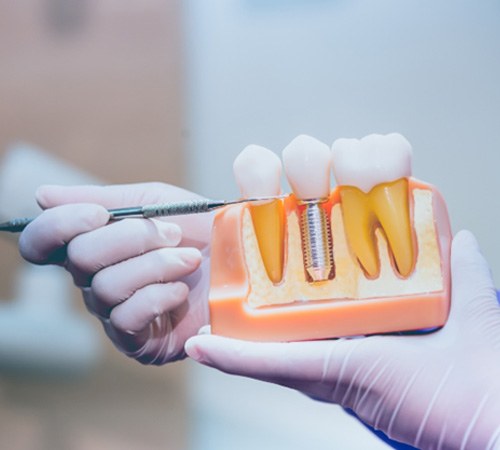Dental Implant Failure & Salvage � Houston, TX
Save Your Newly Restored Smile!

Dental implants are very successful. In fact, they have an incredibly high success rate of 95%! However, this doesn�t mean that the unlikely event of a dental implant failure is out of the question. While this is improbable, it is still important to be aware of the causes of dental implant failure as well as the common symptoms and treatment options. If you have any concerns regarding your dental implants, don�t hesitate to contact us for help!
Why Do Dental Implants Fail?

The most common reason why dental implants fail is due to peri-implantitis. This is an infection that occurs when harmful bacteria invade the tissue around the implants, ultimately causing damage. In the end, the jawbone and gums can deteriorate and no longer be able to support dental implants. Most of the time, peri-implantitis is caused by poor oral hygiene, but other factors can also contribute to this issue.
Another reason why dental implants can fail is due to failed osseointegration. This is when the dental implant and jawbone don�t fuse together as they should. Other causes of failure include physical trauma and medical conditions, including cancer.
Symptoms of a Failed Dental Implant

Whether your implants are brand new, or you have had them for a while now, failure may occur. Here are some of the most common signs of a dental implant failure that you should be keeping an eye out for:
- Severe or Unusual Pain: Some soreness is normal after your procedure. However, after you heal, your dental implants should feel comfortable and natural.
- Loose Dental Implant: In some cases, this can be a problem with the dental crown attached to the implant. In other cases, it could point to dental implant failure.
- Bleeding & Swelling: If you notice bleeding, swelling, or pus, you could be dealing with an infection. You should seek immediate dental attention.
- Difficulty Chewing: When your implants are healed and you have received your replacement teeth, eating should be easy.
How Dental Implant Salvage Works

If you suspect that you could have an issue with one or more of your dental implants, you should give us a call. We can examine your smile, learn more about your symptoms, and discuss treatment options. Sometimes, dental implants can be saved with deep cleanings, antibiotic treatment, and other infection control methods. The faster you seek treatment, the more likely you can keep your dental implants healthy!
